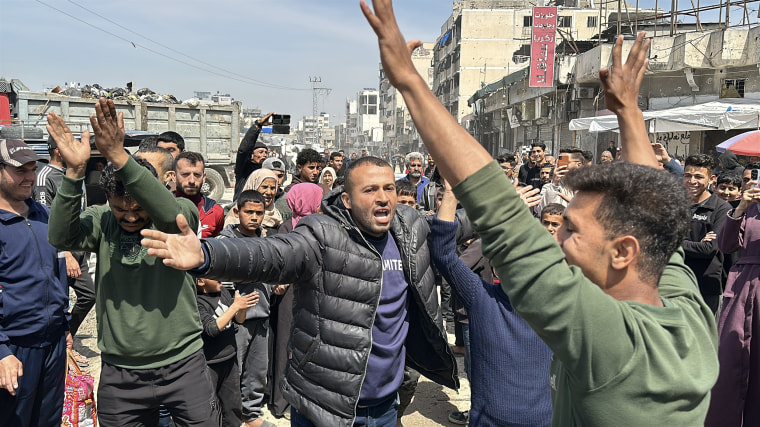Protests in Gaza calling for an end to the war with Israel and for Hamas' ouster gathered momentum Wednesday, with hundreds of demonstrators for a second day displaying rare dissent against the militant group that has run the Palestinian enclave for nearly two decades.
"Leave us Hamas. We want to live freely," a crowd chanted in video captured by NBC News' crew on the ground Wednesday at a rally in eastern Gaza City in the north of the strip. Just over five miles away a similar protest took place in Beit Lahia.
The protests began with an initial demonstration Tuesday in Beit Lahia, where protesters chanted anti-Hamas slogans as Palestinians also railed against the resumption of Israel's military offensive in Gaza, which has so far killed hundreds of people. Renewed fighting shattered a ceasefire deal after two months of relative calm.
Why now?
It was not immediately clear who organized the protests or how many joined them with the intention of rallying against Hamas.
But some demonstrators told NBC News' crew that they had reached the limit of their suffering and blamed Hamas for failing to bring an end to the war.
More than 50,000 people, including thousands of children, have been killed in Israel’s offensive in Gaza, according to the local Health Ministry in the enclave, which has been run by Hamas since 2007 after Israel ended its 38-year occupation.
"We came out to demand that Hamas stop the war and hand the ruling to any merciful body so that God may have mercy upon us," one man, Eyad Gendia, told NBC News at Wednesday's protest in the Shujaiya neighborhood of eastern Gaza City.
"The impact of the war is that we are sleeping in the streets ... We have lost all of our children," he said.

Before this week, NBC News had documented smaller anti-war protests in Gaza but this week's demonstrations represent the biggest since the conflict began after Hamas led terrorist attacks in Israel on Oct. 7, 2023, in which some 1,200 people were killed and around 250 others taken hostage, according to Israeli officials.
Israel, which continues to block the entry of aid and goods into the Gaza Strip, has said it wants to eliminate Hamas to ensure that the Oct. 7 attacks will not be repeated. The United States has supported Israel in its campaign, with President Donald Trump also sparking widespread condemnation by suggesting that America take over the enclave and turn it into the "Riviera of the Middle East."
"If the Israel problem is Hamas, we will expel Hamas to resolve this issue," said another man, who did not share his name. "We are demanding an end to the frantic war against Gaza's children, women and elderly."
"We need a permanent ceasefire," said a third demonstrator, who spoke without offering identification.
The Israeli Foreign Ministry said in a post on X on Wednesday that the anti-Hamas slogans shouted at the protests were proof that "Hamas' refusal to release the hostages" was "fueling war and the suffering of the people of Gaza."
Basem Naim, a senior political official for Hamas, told NBC News on Wednesday that "everyone has the right to scream in pain and to raise their voice against the aggression towards our people," but he said it was "unacceptable to exploit these tragic humanitarian situations for questionable political agendas or to shift blame away from the real aggressors."
Mounting pressure
Hamas' popularity in Gaza is hard to gauge, due to fears over speaking out and the difficulties of conducting polling during a war. But a poll released in September by the Palestinian Center for Policy and Survey Research, a think tank based in the occupied West Bank, found support for Hamas in the Gaza Strip to be at 35%, compared to 38% three months before.
Sanam Vakil, director of the London-based think tank Chatham House’s Middle East and North Africa program, said the protests put fresh pressure on Hamas as Israel and the U.S. push the militant group to agree to an extension of the first phase of the ceasefire deal, which expired March 1, and to release more hostages.
Hamas has refused, instead demanding a return to negotiations aimed at launching the second phase of the deal, as had been planned under the framework of the truce deal. The second phase was meant to pave the way to an end to the war, although the truce disintegrated when Israeli forces resumed airstrikes on Gaza.
"The big questions for Hamas are really, how it can be a resilient political force in the climate of so much pressure?" Vakil said in a phone interview Wednesday.
Hamas has previously signaled it would be willing to cede political power and administrative governance of Gaza to a Palestinian unity government, but said it would be unwilling to disarm until internationally recognized independent Palestinian statehood is achieved.
